Disclosure: Meeple Mountain received a free copy of this product in exchange for an honest, unbiased review. This review is not intended to be an endorsement.
Mercurial does an incredible job of creating a world in which players can run around the sandbox.
From the game’s BGG page: “After an arduous journey through the otherworldly land of Valanyr, your caravan finally arrives at Camp Trinity—a young, thriving settlement built atop a ruined kingdom once decimated by an ancient cataclysm.”
The backstory continues by introducing the fact that players were once “mage[s] of low renown” now seeking a better life by performing Heroic feats. That’s all I need, but there is so much world-building in Mercurial, from the detailed cover page of the rulebook to artwork that hints at players defeating all manor of creatures to flavor text tucked into different sections of the spell combination areas. I recently attended the GAMA Expo event, and a few other content creators raved about the world-building also.
Although I was a little worried that Mercurial’s production would outpace its gameplay, Mercurial eventually reveals itself—the game is a deck builder, a dice manipulation game, a contract / order fulfillment game, and a hand management game featuring multi-use cards.
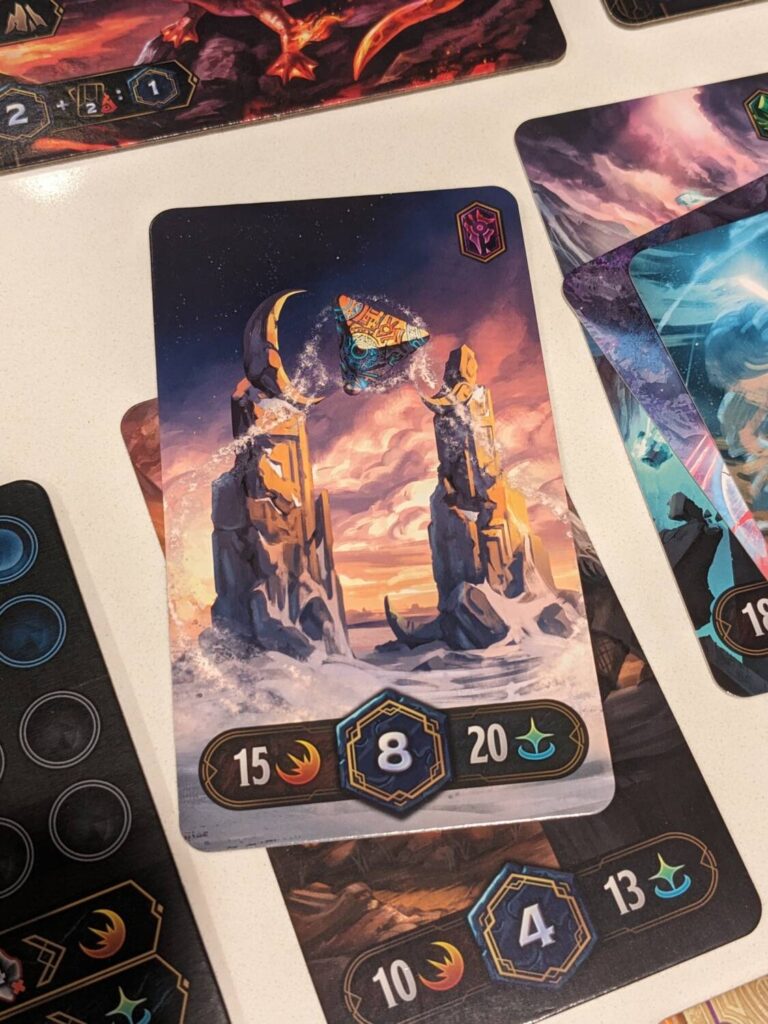
There’s a lot here, but none of it is overwhelming. In fact, I loved that I could teach this game to my wife in about ten minutes. We were off and running, rolling “Elemental” dice and taking turns that were quick in the early-going as we took cards from a tableau to improve our hand of dice mitigation cards while also grabbing Spells, which are the first of two sets of order fulfillment cards.
These Spells require 2-5 matching dice, and the dice placement spots can often be covered by Mana and Acuity crystals from a player’s board. Each Spell has a value in either Ruin (evil?) or Restore (good?) points that will then be used to fulfill a second set of contracts, known as Heroic cards. These Heroic cards serve as both a massive amount of points for a player who can claim them, as well as the game clock. Depending on the player count, a player who claims a certain number of Heroics triggers the end of the game.
The first half of each of my three plays was always interesting. It’s fun to roll dice, it’s fun to assign those dice to get cards that then get you more cards, and the market cards (used to mitigate dice, cards known as Skill Alterations) provide enough options to get the cards you eventually want from the Spell row.
But I was surprised to find that the second half of each play was less interesting. The actions felt “samey” without adding enough bite to the back half of the game. Gameplay doesn’t evolve here in the way that I was hoping or expecting.
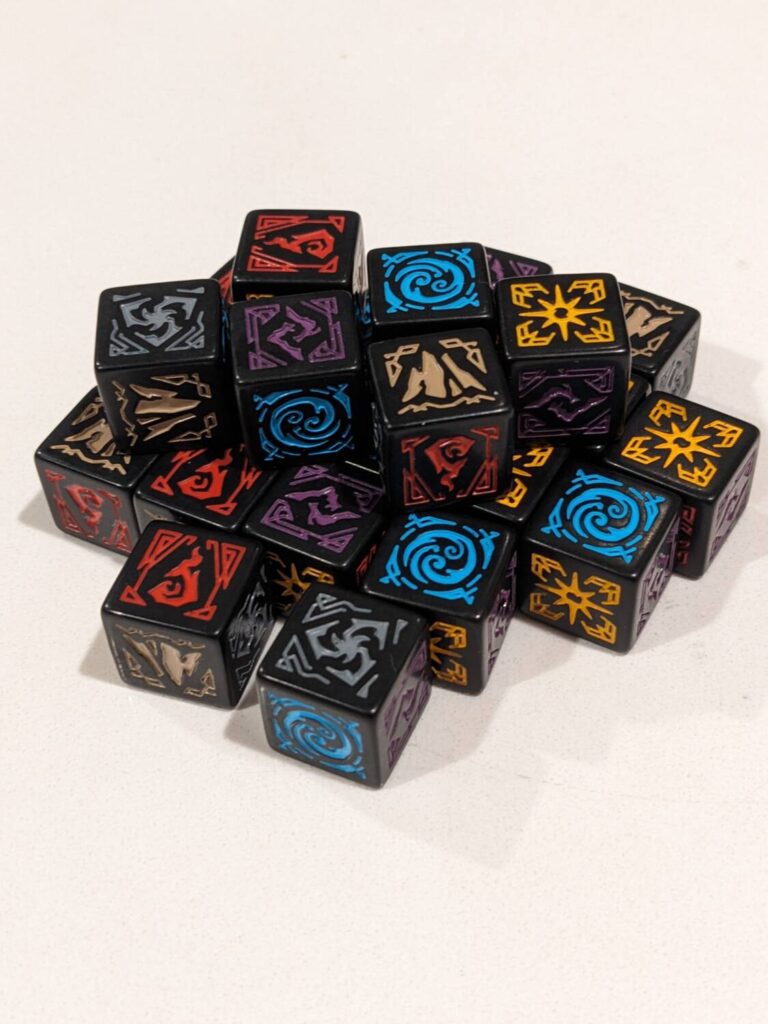
Come to Valanyr, But Come Alone
Mercurial accommodates 1-4 players. The solo mode is the way to go here, because adding players doesn’t add much to the game’s level of interaction. Sure, another player might snake the card you want from one of the card rows, but there’s enough variety in the Spell and Skill Alteration cards that you’ll usually be able to find something that works. It’s the Heroic cards that feel quite limited–with only 18 of those cards in the game, featuring point values that range widely. If you can get 3-4 double-digit point Heroics, you have a great shot of winning the game.
Even playing alone, Mercurial took about 45 minutes to finish. (You take turns normally, then wipe cards from the end of two card rows at the end of each turn.) You are playing against a high-score chart, and my solo play score of 76 points came up just shy of “Expert” range, although it didn’t really feel like I should be an expert just yet. More players added more time in the form of patiently waiting to take my turns.
The production really shines here. The rulebook was well-written, the insert is fantastic (and has plenty of room for expansion content), and the cards look great. The game’s double-sided player aid doesn’t list the game’s main actions, but those are on the back of the rulebook and I found that I didn’t need those reminders during my games.
It sounds silly, but I wish there was more opportunity to interact with the world being built around this game. Mercurial credits eight different artists who covered everything from the box cover art to the different cards to the Arcana milestone tiles to the player boards. Those were all done by different people, and this makes Mercurial feel quite rich.
But it feels like I should want to pursue certain questing goals in and around Valanyr, which of course is not possible here. Some of the Heroic cards feel like I should be doing really epic stuff…then I resolved my three spells worth 12 points of Ruin, and added a card to my end-game scoring pile. The spell cards aren’t special; you place your dice and crystals on each card, then do that enough times to “cast a spell” to take a Heroic card from the market.
This is disappointing, because the game wants to be much more. As it is, the experience feels a little empty, and it takes much too long to wrap up play.
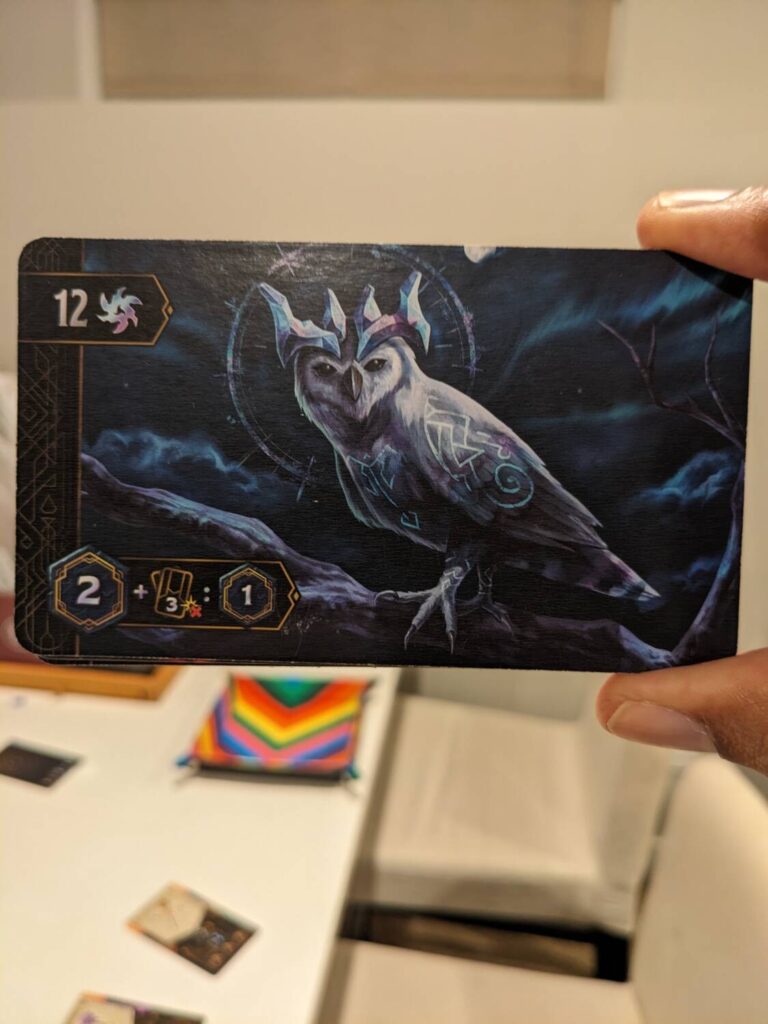
House Rules?
Mercurial, designed by David Goh and published by Good Games Publishing, is fine. But there aren’t enough “wow” moments here.
The game features four classes for players to try, but none of the class powers feel distinct. I tried the Elementalist and the Arcanist, along with the Initiate (located on the back of each class board, with no powers and used as a way to introduce Mercurial to new players). Neither of the specialized classes felt like I had a gamebreaking cheat power, like you get in games such Marco Polo II: In the Service of the Khan.
As players approach the midway point of a game, nothing really changes. You’ll have better Skill Alteration cards by then, but the cards all play the same way—card X lets you change fire dice to water dice. Or maybe a card lets you pay Acuity to change a mountain die to a fire die, then you get to draw more Acuity for use on this and future turns. Cool, but it never evolves to be anything more special. Your pool of Mana crystals slowly grows during the game, making it easier to resolve spell cards.
Great, but not “wow.”
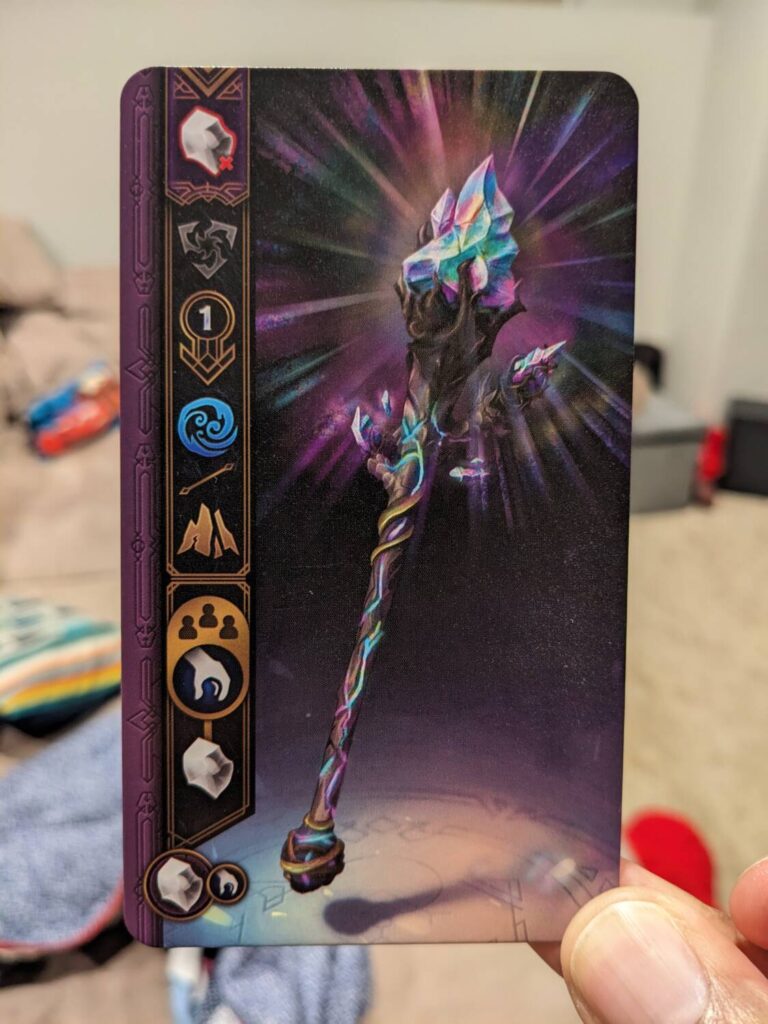
The most disturbing element of the Heroic cards is the fact that each card can be fulfilled with a certain number of Restore points, or a lower number of Ruin points. But Ruin points are available at what seems like the same rate as the Restore points. That led to my wife and I both saying that it feels like I should always be trying to fulfill Heroic cards with Ruin points, since there’s no penalty for doing so.
If I should do the exclusively cheaper thing, I’m going to do that every time, right?
I house ruled some of the game’s parameters for a final play and found the experience more rewarding. In a two-player game, starting with even one additional Mana crystal opens up chances to get better Heroic cards early in the game. The end-game trigger should be four Heroics and not five in a two-player game. You could even get away with a first-to-three-Heroics trigger and still get plenty of game out of Mercurial.
The base game’s rules allow anyone to use their “take” action to discard a Spell card for a single Acuity. That’s not great, so altering this rule from one Acuity to three Acuity allows for a more powerful action on their next turn.
Some of these minor changes helped turns feel snappier and more powerful, but they still don’t address the elephant in the room—nothing feels quite epic enough to match the game’s production. My kids would definitely read a book based on the characters featured in this world, but the gameplay doesn’t match up.
I really enjoyed my first solo play. My second and third (multiplayer) games were a bit less interesting. When dice rolls worked out, I was grabbing spell cards and setting up additional Heroic card buys quickly. When the dice didn’t work out, Mercurial offered interesting ways to get around poor rolls, but it never reached a real crescendo.
For those who like games set in mystical fantasy settings, Mercurial is worth a look for the artwork alone. The production is handsome, with some of the coolest-looking dice I will probably see this year. But as a game, Mercurial is not a product I will return to.


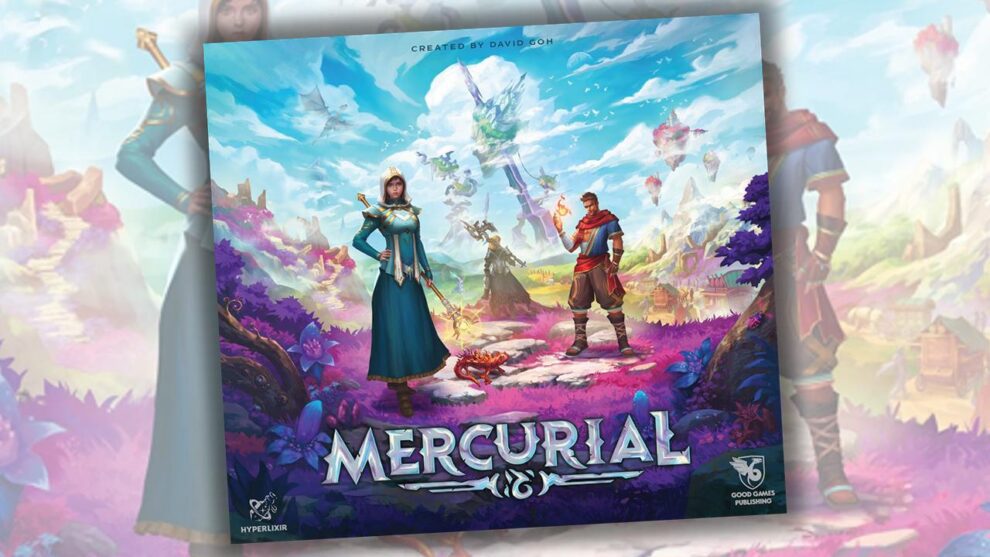
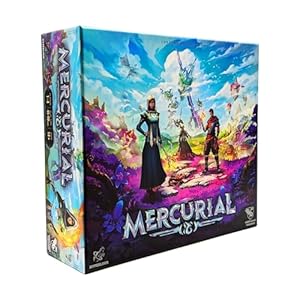








I’ve played Mercurial several times and I disagree with two of your assessments on the game. First, Spells usually give more Restore than Ruin, as you’ll find any time you try to build towards Equilibrium (i.e. exactly equal amounts of Restore and Ruin). It’s difficult to pull of specifically because you usually get the two resources in different quantities. Indeed, several of the game’s spells give you the option of generative Ruin or Restore with them, and the Restore values are always higher. Aiming for Equilibrium in particular is a very risky proposition but highly rewarding, and if you see your opponent(s) going for that strategy you can often draft the spells they need before they can and really set them back.
Second, the classes don’t have unique game-breaking powers but they do play significantly differently from each other. The Chaosmancer starts with 7 dice but very little Mana and gets to re-roll 4 dice when they discard an Alteration instead of 2. Since the re-roll action is basically a ‘free’ action since you get to take another action right after, the Chaosmancer is great at converting all those Alterations in the row into useful resources even if the primary effect on the card isn’t immediately useful. By comparison, the Arcanist only has 5 dice but always has Aether available, regardless of what the dice says, plus a reasonable starting mana pool. They also start with a unique Alteration that lets them manipulate Aether into other elements. The Arcanist can cast some ridiculously high scoring spells if they’re able to snag those valuable Aether-enhanced spells, which immediately adds another layer of hate-drafting to the game. Then you’ve got the Elementalist that generates Acuity really fast, the Enchanter that starts with thee relics instead of one, and the Mistwalker that has every Sigil at the start and thus enhances most of the Alterations in the game.
I’d personally rate Mercurial a 4/5 that rises to a 4.5/5 if you’re a solo player and have the deluxe version.